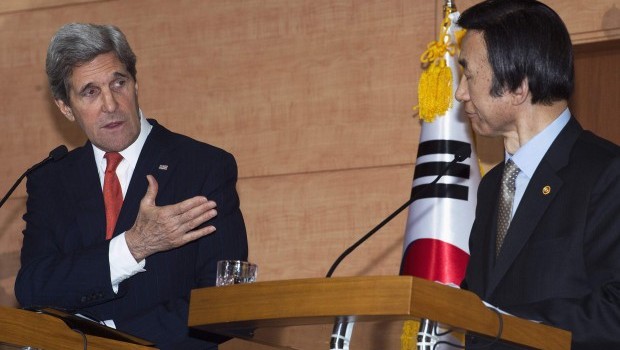
US Secretary of State John Kerry (L) gestures next to South Korea’s Foreign Minister Yun Byung-se during a joint news conference at the Foreign Ministry in Seoul April 12, 2013. (REUTERS/Paul J. Richards/Pool)
Speaking in Seoul with South Korean Foreign Minister Yun Byung-se, Kerry said it would be a “huge mistake” for North Korea to conduct a missile test, something South Korean officials say could happen at any time. He called on China, North Korea’s closest ally, to help defuse the situation.
“We have lowered our rhetoric significantly and we are attempting to find a way for reasonableness to prevail here,” Kerry told reporters after meeting with Yun and South Korean President Park Geun-hye. “We are seeking a partner to deal with in a rational and reasonable way.”
Park Thursday offered to resume discussions with North Korea after weeks of threats to attack the United States and South Korea. While a Pentagon report has concluded the North may be capable of putting an atomic device on a ballistic missile, Kerry said it was inaccurate to say Kim Jong Un’s regime can construct a nuclear missile.
Kerry, who goes to China Saturday and Japan the day after, is visiting a region that’s been on edge since February, when North Korea detonated an atomic bomb in defiance of tighter United Nations sanctions. With a possible missile test looming, defusing the situation will require a coordinated message that dialogue is preferable to a conflict that could draw in the US.
“Washington and Seoul can keep repeating that they will engage once North Korea does ‘X,’ but North Korea is not going to make the first move,” said John Delury, a professor at Yonsei University’s Graduate School of International Studies in Seoul. “The US is probably looking to Seoul to make the first move, and Park’s overture may be that.”
Yun called North Korea’s warning this week that foreigners living in South Korea might be in danger “a provocation against the entire international community.” He concurred with Kerry’s assessment of the North’s nuclear missile capabilities, saying “they still need a lot of time to achieve” the technology capable of launching one.
Kerry said Kim, who succeeded his father Kim Jong Il as leader in December 2011 and is thought be under 30, needs to understand what the outcome of a conflict would be.
“Our preference would be to get back to talks,” Kerry said, either directly or through the six-nation discussions that the North has pulled out of.
Kerry said he will take his concerns to Beijing, where he will meet new Chinese President Xi Jinping to discuss implementation of UN sanctions that China agreed to in March against its ally. North Korea is dependent on China for its energy needs and trade.
“No country in the world has as close a relationship or as significant an impact on the DPRK than China,” Kerry said, referring to North Korea’s official name, the Democratic People’s Republic of Korea. “China has an enormous ability to help make a difference here.”
North Korea may conduct a weapons test to coincide with the 101st anniversary of state founder Kim Il Sung’s birth on April 15, South Korean Defense Ministry spokesman Kim Min-seok said Thursday in Seoul. Last April 13, North Korea fired a long- range missile that disintegrated shortly after liftoff, then successfully launched one in December.
The regime yesterday reiterated that it is on a war footing and its warheads are programmed with target coordinates. Kim Jong Un, who succeeded his father Kim Jong Il as leader in December 2011 and is thought be under 30, has rebuffed offers of international aid in favor of preserving a military-first policy to reinforce his legitimacy.
“It’s up to Kim Jong Un what he decides to do,” Kerry said. “It’s not going to change our position, which is very, very clear. We will defend our allies.”

May I simply just say what a comfort to discover
somebody who truly knows what they’re discussing on the net. You definitely realize how to bring a problem to light and make it important. More people have to read this and understand this side of the story. It’s surprising you aren’t more popular since you certainly have the gift.